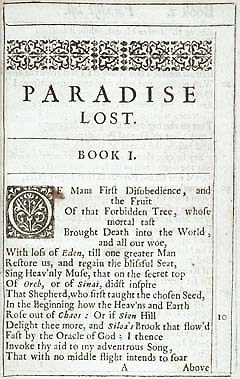John Milton (1608–74) was a pupil of Joseph Mede, who was also an early influence on Samuel Hartlib in the 1620s. Hartlib and Milton collaborated on several fronts during the 1640s, sharing an interest above all in the reform of education. In 1644, Milton offered to write up his thoughts on this subject for Hartlib, who duly had them published. Although he remained wedded to a more humanist, less vocational style of instruction than some of Hartlib’s other correspondents, he was committed, like them, to the idea of state support for education. During the 1650s, Milton served as Latin secretary to the Council of State, and maintained occasional contacts with Hartlib. Towards the end of that decade, he began to compose his great poem, Paradise Lost, which dramatized the story of the Fall. The work was completed by the mid-1660s, and, in April 1667, Milton reached an agreement with a publisher, whereby he was paid £5 for the right to print the poem, with a further £5 to follow after the sale of the first edition of 1,300 copies (and to be paid again on the sales of two subsequent editions). Various changes were made to the title-page during the course of printing; the copy here represents the fourth state of the first edition of the work. By this point, Milton’s poem was selling well, and further editions were soon called for.
Despite the many heterodox beliefs of its author, Paradise Lost succeeded in becoming both a model for English verse and a popular guide to the interpretation of the opening chapters of Genesis, whose story it dramatized. Quotations from the poem frequently embellished people’s attempts to interpret or apply the Bible (as can be seen in catalogue no. 20). Milton was particularly successful in capturing the emotions of Adam and Eve, and, thus, in making the biblical narrative more immediate and more affecting to his readers.




